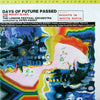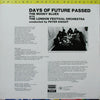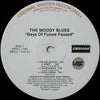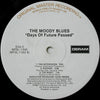









The Moody Blues – Days Of Future Passed - Featuring The London Festival Orchestra Conducted By Peter Knight (Half-speed Mastering, non scellé)
RARITY - Unsealed
The Moody Blues [click here to see more vinyl featuring The Moody Blues]:
- Justin Hayward – guitar, vocals
- John Lodge – bass, vocals
- Mike Pinder – Mellotron, vocals
- Ray Thomas – flute, vocals
- Graeme Edge – drums
The London Festival Orchestra conducted by Peter Knight
Arranged by Peter Knight
Written by Peter Knight (A1, B3), Graeme Edge (A1, B3), Mike Pinder (A2, B2), Ray Thomas (A3, B2), John Lodge (A4, B1), Justin Hayward (B1, B3)
1 LP, Gatefold jacket
Limited numbered edition
Original analog Master tape : YES
Half-speed mastering,
Heavy Press : 180g SuperVinyl
Record color : black
Speed : 33RPM
Size : 12”
Stereo
Studio
Record Press : Victor Company of Japan, Ltd
Label : Mobile Fidelity - Original Master Recording Series
Original Label : Deram
Recorded 9 May – 3 November 1967 at Decca Studio, London
Engineered by Derek Varnals
Produced by Michael Dacre-Barclay, Tony Clarke
Executive-Producer – Hugh Mendl
Remastered by Stan Ricker at Original Masteringworks
Liner Notes by Hugh Mendl
Cover Painting by David Anstey
Originally released in November 1967
Reissued in November 1981
Tracks:
Side A:
- The Day Begins
- Dawn: Dawn Is A Feeling
- The Morning: Another Morning
- Lunch Break: Peak Hour
Side B:
- The Afternoon: Forever Afternoon (Tuesday?)
- Evening: The Sun Set: Twilight Time
- The Night: Nights In White Satin
Awards:
Rolling Stone list of the essential albums of 1967
Reviews :
“This album marked the formal debut of the psychedelic-era Moody Blues; though they'd made a pair of singles featuring new (as of 1966) members Justin Hayward and John Lodge, Days of Future Passed was a lot bolder and more ambitious. What surprises first-time listeners -- and delighted them at the time -- is the degree to which the group shares the spotlight with the London Festival Orchestra without compromising their sound or getting lost in the lush mix of sounds. That's mostly because they came to this album with the strongest, most cohesive body of songs in their history, having spent the previous year working up a new stage act and a new body of material (and working the bugs out of it on-stage), the best of which ended up here. Decca Records had wanted a rock version of Dvorak's "New World Symphony" to showcase its enhanced stereo-sound technology, but at the behest of the band, producer Tony Clarke (with engineer Derek Varnals aiding and abetting) hijacked the project and instead cut the group's new repertory, with conductor/arranger Peter Knight adding the orchestral accompaniment and devising the bridge sections between the songs' and the album's grandiose opening and closing sections. The record company didn't know what to do with the resulting album, which was neither classical nor pop, but following its release in December of 1967, audiences found their way to it as one of the first pieces of heavily orchestrated, album-length psychedelic rock to come out of England in the wake of the Beatles' Sgt. Pepper's and Magical Mystery Tour albums. What's more, it was refreshingly original, rather than an attempt to mimic the Beatles; sandwiched among the playful lyricism of "Another Morning" and the mysticism of "The Sunset," songs like "Tuesday Afternoon" and "Twilight Time" (which remained in their concert repertory for three years) were pounding rockers within the British psychedelic milieu, and the harmony singing (another new attribute for the group) made the band's sound unique. With "Tuesday Afternoon" and "Nights in White Satin" to drive sales, Days of Future Passed became one of the defining documents of the blossoming psychedelic era, and one of the most enduringly popular albums of its era.” AllMusic Review by Bruce Eder
Half-speed mastering. In half-speed mastering, the whole process is slowed down to half of the original speed. A typical 33 1/3 rpm record is cut at 16 2/3 rpm. The source material is also slowed down (reducing the pitch in the process) meaning the final record will still sound normal when played back. Slowing the whole process down allows more time, which means the end result sounds better and is more efficient — allowing engineering to minimize the effects of inherent limitations within the vinyl format. The result is a more accurate and more open high-frequency response in the half speed vinyl when compared with a normal speed recording.
UHQR :
UHQR pressing is inspired from JVC Japan, which 30 years ago was the pinnacle of high-quality vinyl. Each UHQR vinyl is pressed, using hand-selected vinyl, on a manual Finebilt press with attention paid to every single detail of every single record. From the lead-in groove to the run-out groove, there is no pitch to the profile, allowing your stylus to play truly perpendicular to the grooves from edge to center. Every UHQR is hand-inspected upon pressing completion, and only the truly flawless are allowed to go to market.
Ratings :
AllMusic : 4 .5 / 5 , Discogs : 4.56 / 5

